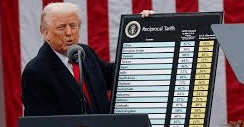Business News of Wednesday, 16 April 2025
Source: www.ghanawebbers.com
Ghana's Resilience in the Face of U.S. Tariffs: A Call for Innovation and Unity

The Immediate Impact of U.S. Tariffs
U.S. tariffs on Ghanaian goods threaten the nation's export competitiveness. This includes cocoa, aluminum, and agricultural products.
Ghana's economy is recovering from COVID-19 disruptions. The pandemic strained supply chains and reduced global demand for its products.
Dr. Nana Baa Wiredu, an International Tourism Consultant, emphasizes the urgency. He states that tariffs could harm many Ghanaians' livelihoods. Smallholder farmers and local businesses are particularly at risk.
A Collaborative Approach to Strategy Development
To address these challenges, Dr. Wiredu suggests a collaborative approach. This should involve the government, private sector, and civil society.
He calls for a comprehensive strategy to tackle current tariffs and promote future growth. The strategy must examine affected industries and identify new trade opportunities.
Establishing a task force with representatives from various sectors is crucial. This group can facilitate dialogue and coordinate efforts to enhance Ghana’s competitiveness.
Expanding Trade Relationships within Africa
Dr. Wiredu highlights the need to strengthen trade ties within Africa. The African Continental Free Trade Area (AfCFTA) offers Ghana a chance to diversify its markets.
He notes that AfCFTA is more than just a trade agreement; it promotes economic integration. By engaging regional partners, Ghana can reduce reliance on traditional markets like the U.S.
The potential for intra-African trade is significant, and Ghanaian businesses should seize these opportunities.
Enhancing the Competitiveness of Exports
Improving the competitiveness of Ghanaian exports is essential as well. Dr. Wiredu suggests investing in production efficiency and quality improvement.
Supporting local enterprises in modernizing operations is vital for success. Government incentive programs can encourage businesses to invest in their capabilities.
By focusing on quality and uniqueness, Ghana can improve its position in global markets despite tariff barriers.
Attracting Foreign Direct Investment
Attracting foreign direct investment (FDI) presents another growth opportunity for Ghana. Dr. Wiredu points out that political stability makes Ghana appealing to multinational companies.
As global supply chains shift, Ghana could become an investment hub in less impacted sectors. Promoting itself as an investment destination can lead to job creation and technology transfer.
This will help diversify the economy while attracting investors seeking opportunities in Africa.
Prioritizing Tourism as a Growth Sector
Dr. Wiredu stresses tourism's importance for economic recovery in Ghana. With rich cultural heritage and natural attractions, tourism can generate foreign exchange and jobs.
Investing in tourism infrastructure will attract international visitors effectively. A national tourism strategy can help capitalize on strengths as a premier African destination.
By enhancing visitor experiences, Ghana can build a resilient tourism sector contributing to economic stability.
Fostering a Culture of Innovation
In uncertain times, fostering innovation is crucial for progress. Dr. Wiredu believes embracing new ideas will help adapt to challenges effectively.
Encouraging entrepreneurship supports startups that drive economic growth through creativity.
Investment in education is also vital for workforce development amid changing demands.
Nurturing talent fosters continuous learning for building resilience in the economy.
Optimism for the Future
Despite challenges from U.S tariffs, industry experts remain optimistic about Ghana's future.
With coordinated efforts, Ghana can navigate these difficulties successfully.
Dr.Wiredu concludes that unity and collaboration are key to overcoming obstacles.
By leveraging strengths and exploring new markets, this challenge could lead to sustainable growth.
Ghana stands at a crossroads now; collective effort is needed for building a competitive economy amidst adversity.










